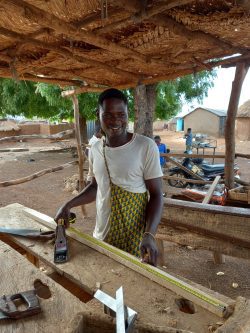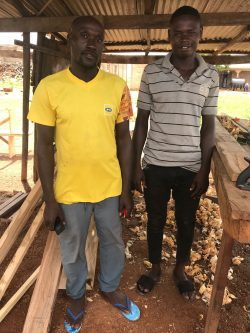

In 2021/2022, 40 young men and women from the Karaga and Mamprugu Moagduri districts of Ghana undertook livelihood and life skills training with our partner NORSAAC. Specialising in either tailoring, welding, carpentry, or motorbike mechanics, each trainee completed the project equipped with a nationally recognised qualification and the technical skills with which to earn an income.
Amongst the carpentry trainees is Alidu Sabit. We first met him in June last year while he was still completing his training. He told us: “I gained hope in my life when I set my foot outside our community to be trained as a professional Carpenter. I have not regretted for the decision to learn this skill. I see my future to be bright as I will one day set up my own shop to take care of myself and family”.
Retuning to Karaga one year later, we caught up with Alidu again to find out where his skills are taking him.

Alidu Sabit training in carpentry, June 2022
After graduating from his vocational training with an NVTI level 1 certificate in carpentry, Alidu joined our Transition to Work project which helps graduates take the next steps from learning to earning. This six-month programme challenges participants to think strategically about how to increase income and profitability when starting their business ventures. This includes encouraging graduates to define what makes their products special and their business unique, but also how to work collaboratively. Artisans are placed in working groups according to their area of expertise (tailoring, carpentry, welding, and motorbike mechanics) and by working together, they are able to share experiences and leverage each other’s strengths to increase business.
We ask Alidu how he is applying the Transition to Work topics to his own business. He explains that as one five carpentry graduates in Karaga, he has learned that it is important to make sure that his products stand out from the competition. Whilst Alidu can turn his hand to everything from roofing to window-installation, during the agricultural season when construction projects are on-hold he is mainly commissioned to make furniture, such as beds and wardrobes. To make sure that customers choose his products over others, Alidu concentrates on the quality of his workmanship. He explains that high-end products demand quality materials, so he visits his timber suppliers before committing to placing an order. He says, “it is important to go in person as sometimes the materials are damaged or poor quality . By going there myself I have the opportunity to take pictures of the materials to share with my customers.” Alidu is able to reject and low grade or damaged timber and work with his clients to agree the best way forward if suitable materials are not available.
Next, Alidu talks to us about cash flow. With most of his customers paying for goods on completion, he tells us that it can be difficult to establish a business without money up-front to buy timber. He explains that the Transition to Work project provided him with a business grant, which was invaluable in helping him get started. He says, “Without the business grant, I wouldn’t have been able to acquire new materials.” As his business and his reputation grows, Alidu plans to see greater profits, which he will use to buy materials and so protect his business capital. He is considering asking his customers to put down a deposit, or make an advance payment, so he can buy the timber he needs and encourage customers to collect their items on completion.

Alidu (right) with fellow carpenter, Zakaria Selimana in August 2023
As part of the Transition to Work project, Alidu has also joined a village savings group. He says, “I have used the proceeds from the savings to solve my personal problems and I can offer some small support to my father during the farming season”. He has also been able to purchase a mobile phone. Alidu tells us how essential a phone is for maintaining his customer base and liaising with clients. Buy he also uses it for peer-to-peer support. He explains that if ever his is poorly, or unable to complete a customer’s order, he can contact other carpenters in the district and ask them if they can take on the unfinished work. In this way the he is able to build relationship with other Transition to Work participants, and be part of a business support network.
It’s still early days for Alidu’s carpentry business but already he has plans for his future. We ask him where he sees his business in three years time. He replies: “I want to expand my business and employ apprentices to help fulfil the orders.”
We wish Alidu every success in growing his carpentry business! We look forward to following his progress and hope to meet his team of apprentices in the future.
By Vicky Fernandes, Individual Giving Officer
Africa Programme Manager, Ash Phillips, and Individual Giving Officer, Vicky Ferndandes, visited Karaga in August 2023. With grateful thanks to our NORSAAC partners for arranging participant interviews, travel and translation.
Projects such as these would not be possible without you. We want to say a big THANK YOU for all of your kind donations, and for your preloved tools which support our projects. If you would like to support our life-changing projects, please click here to give a one-off gift or set up a regular donation. Thank you.
October 2023